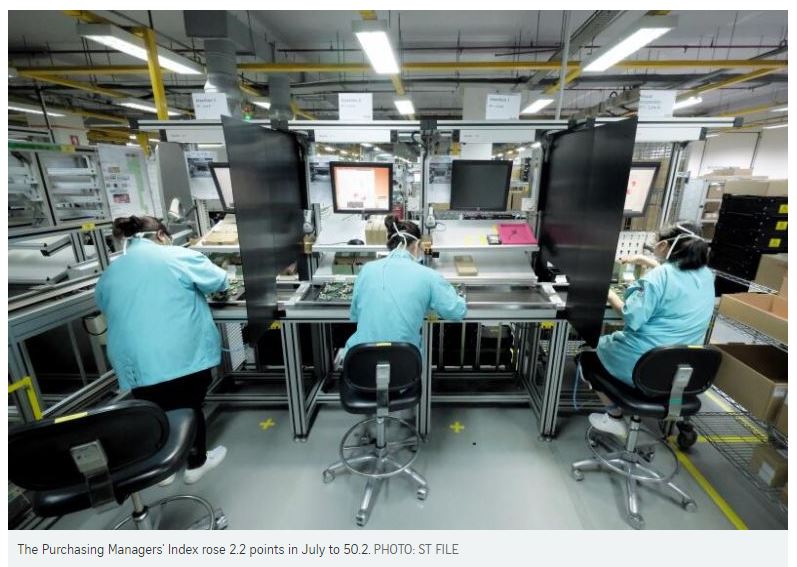Singapore factory activity gauge jumps back into expansion territory
SINGAPORE – Manufacturing activity made a surprise jump into expansion territory in July after five straight months of contraction amid the coronavirus-induced slump.
However, the outlook for the rest of the year remains uncertain amid a resurgence in infections in several major economies, prompting re-imposition of some lockdown measures.
The Purchasing Managers’ Index (PMI) rose 2.2 points in July to 50.2 – higher than the 48.6 median estimate in a Bloomberg survey of economists. A PMI reading over 50 indicates expansion; one below 50 shows contraction.
The electronics sector PMI also increased last month but the 1.6-point rise to 49.2 kept it within the contraction territory for a sixth month in a row, according to data out on Monday (Aug 3).
“The July expansion reading is a welcome respite for the Singapore’s manufacturing,” said Ms Sophia Poh, vice-president of industry engagement and development at the Singapore Institute of Purchasing and Materials Management, which compiles the PMI.
Overall manufacturing PMI had been in recovery after hitting a trough of 44.7 in April – the lowest since November 2008 during the global financial crisis.
Manufacturing, which accounts for nearly a quarter of the domestic economy, has helped put a floor under the precipitous decline in GDP led by the services sector – retail, food and beverage, travel and hospitality – that is likely to pull Singapore into its deepest recession since independence.
The country ended the most stringent of its two-month long circuit breaker measures on June 1 and further relaxed curbs on June 19 to allow more shops and businesses to resume normal operations.
The July PMI increase was attributed to an improvement in new orders, a first-time expansion in new exports and factory output, as well as a faster rate of expansion in the inventory index.
Slower contractions were recorded for the indexes of finished goods, imports, and input prices, while the order backlog index expanded for the first time after five months of contraction.
However, Ms Poh said manufacturers are still concerned about the outlook due to persistent uncertainties around lockdown measures.
The resurgence in infections and the United States-China trade conflict have raised fears of renewed disruption of supply chains and dampening of global demand, she added.
Those concerns were reflected in Monday’s data with indexes for employment and supplier deliveries contracting at faster rates in July than June. The overall employment index for the manufacturing sector has now posted contractions for six consecutive months.
Ms Selena Ling, head of treasury research and strategy at OCBC Bank, said the faster pace of contractions in the employment and supplier deliveries indexes suggests that the improvement in manufacturing sentiment has yet to extend to greater hiring intentions and that global supply disruptions have eased but are yet to fully subside.
“Given the long tail of the Covid-19 pandemic, the second half 2020 recovery may also be bumpy and potentially run into some speed bumps ahead,” Ms Ling noted.
The electronics PMI failed to resurface above the 50-point mark despite recent earnings reports showing global technology companies like Apple, Amazon, Facebook, and Alphabet thriving amid the pandemic as consumers work, shop and entertain from home.
“The question is if Singapore’s electronics industry can ride this wave to capitalise on the broader industry trends,” said Ms Ling.
UOB economist Barnabas Gan said further expansions in Singapore’s headline PMI will depend on the global manufacturing outlook for the rest of the year.
“Singapore’s economic prognosis may still stay soft in the second half given the slowdown of global demand… amid the uncertainty over how the Covid-19 situation could evolve … and the risk of a spike in infection in Singapore’s key trading partners,” added Mr Gan.
Regional manufacturing PMI reports for July reflect a mixed picture. China has led the recovery followed by Taiwan. However, South Korea, Indonesia, Thailand and Japan are still in contraction territory.
PMI dropped in Malaysia back to the 50 mark, the Philippines went into deeper contraction while Vietnam slumped back below the 50 level.
“This suggests that while the manufacturing recovery is likely to sustain in the months ahead, the rest of Asia may lag behind China’s first-in-first-out momentum,” said Ms Ling.
Source: https://www.straitstimes.com/business/economy/singapores-factory-activity-gauge-jumps-back-into-expansion-territory


 English
English




